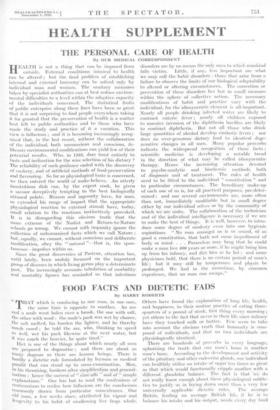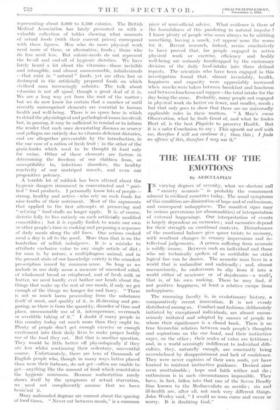FOOD FACTS AND DIETETIC FADS
By HARRY ROBERTS
"HAT which is conducing to one .man, in one case, T , the same time is opposite to another. An ass and a mule went laden over a brook, the one with salt, the Other with wool : the mule's pack was wet by chance, the :salt melted, his burden the lighter, and he thereby Muoll eased ; he told the ass, who, thinking to speed 4S veil, wet his pack likewise at the next water, but it Was much the heavier, he quite tired."
Diet is one of the things about which nearly all men are prepared to dogmatise ; and there are about as many dogmas as there are human beings. There is hardly a dietetic rule formulated by layman or medical pundit that can stand up to cross-examination. Man, in his theorising, hankers after simplification and general- . isation ; . hence the success of "cure-,allS " and of " simple, explanations." One has but to read the confessions of, centenarians to realise how fallacious are the conclusions , commonly drawn from particular coincidences.:, One old plan, a few weeks since, attributed his vigour and longevity to his habit of swallowing live frogs whole. Others have found the explanation of long life, health, and happiness, in their routine practice of eating three- quarters of a pound, of steak, first thing every morning ; yet others to the fact that never in their life since infancy have they touched milk or butter. Few seem to take into account the obvious truth that hunianity is com- posed of individuals, and that no two individuals are physiologically identical. ' There are hundreds of proverbs in every language, aphorising the truth that one man's boon is another man's bane. According to the development and activity of the pituitary and other endocrine glands, one individual can healthily .utilise an intake of sugar-ten times as great as that which would functionally' cripple another with a different glandular ' balance. The fact is that 'WC do not really know enough about these physiological subtle- ties to justify us in laying down more than a very few mliverSally applicable dietetic rules. The average leading an average British life, if he is to balance his intake and his output, needs every day food representing about 3,000 to 3,500 calories. The British Medical Association has lately presented us with :a valuable collection of tables showing what amounts of actual foods (with their current prices) correspond with these figures. Men who do more physical work need more of these, or alternative, foods .; :thorse who do less need less. But calorie-needs do not represent the be-all and end-all of hygienic dietetics. We have lately heard a lot about the vitamins—those invisible and intangible, and almost unmeasurable, infinitesimals —that exist in " natural " foods, yet are often lost or destroyed in the artificially prepared foods on which civilised man increasingly subSists.. The talk • about vitamins -is not all spoof; though :a great deal of it is. We arc a long way yet from the root of the Matter ; but we do now know for certain that a number of until recently unrecognised elements are essential to human health and well-being. There is no space here in which to detail the physiological and pathological issues involved;' but, in passing, it may be sufficient to remind or to inform the reader that such once devastating diseases as scurvy and pellagra are entirely due to vitamin-deficient dietaries, and are altogether preventable by the introduction, in the one case of a ration of fresh fruit. ; in the other of the' grain-husks which used to be thought fit food only for swine. Other of these elements are factors in determining the freedom of our children from,' or susceptibility to, infectious • disorders, the healthy reactivity of our unstriped muscle, and even our progenitive potency. • A terrible lot of rubbish has been 'uttered about the hygienic dangers immanent • in concentrated and " purr lied " food products. I personally know lots of people-- strong, healthy and active—who rely on 'such foods for nine-tenths of their nutriment. Most of the arguments that applied to the first attempts at preserving and " rening " food-stuffs no longer apply. It is, of course, dietetic folly to live entirely on such artificially modified comestibles ; but it is equally foolish to waste our own or other people's time in cooking and preparing a sequence of daily meals along the old lines. One serious cooked meal a day is all to the good. More than that is on the borderline of selfish indulgence. It is a mistake to attribute exclusive value to any single article of diet ; for man is, by nature, a multiphagous animal, and in the present state of our knowledge variety is the soundest prescription issued by common sense. So long as we include in our daily menu a measure of uncooked salad, of wholemeal bread. or crispbread, and of fresh milk or butter, we need hardly ever bother our heads about the things that make up the rest of our meals, if only we get enough of the things we hunger for and fancy. " There is not so much harm proceeding from the substance itself of meat, and quality of it, in ill-dressing and pre- paring, as there is from the quantity, disorder of time and place, unseasonable use of it, intemperance, overmuch or overlittle taking of it." I doubt if many people in this country today eat much more than they ought to. Plenty of people don't get enough exercise or enough excitement into their daily lives to make proper bodily, use of the food they eat. But that is another question. They would be little better off physiologically if they ate less whilst continuing their sedentary, uneventful course. Unfortunately, there are tens of thousands of English people who, ,though in many ways better placed than were their forbears, do not get—roften are unable to get—anything like the amount of fodd which constitutes the hygienic minimum. Because malnutrition rarely shows, itself by the symptoms of actual starvation, we need not complacently assume that we have banis'ied it.
Many, unfounded dogmas are current about the spacing of food times. " Never eat between meals," is a common piece of semi-official advice. What evidence is there of the harmfulness of this pandering to natural impulse ? I know plenty of people who seem always to be nibbling something, having a snack, yet appear none the worse for it. Recent research, indeed, seems conclusively to have proved that, for people engaged in active physical work or exercise, efficiency and bodily well-being are seriously handicapped by the customary division* of the daily food-intake into three defined repasts. The scientists who live been engaged in this investigation found that, almost invariably, health, happiness and capacity were appreciably increased when snacks were taken between breakfast and luncheon And between luncheon and supper—the total intake for the day being the same. Probably, many people not engaged in physical work do better on fewer, and smaller, meals ; but that only goes to show that there are no universally applicable :rules in 'these matters. " A Man's owne ObserVation, what he finds Good of, and what he findes Hurt Of, is the best Physicke to preserve Health. But it is a safer Conclusion to say ; This agreeth not welt with me, therefore I will not continue it ; than this ; I finde no offence of this, therefore I may use it."



























































 Previous page
Previous page